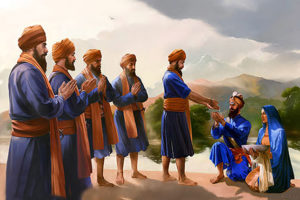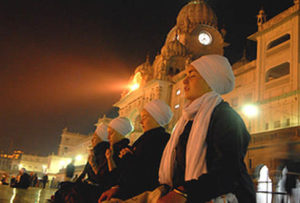The origins of Sikhi

Sikhism was born in the Punjab area of South Asia in India. The main religions of the area at the time were Hinduism and Islam.The Sikh faith began around 1500 CE, when Guru Nanak began teaching a faith that was quite distinct from Hinduism and Islam. Nine Gurus followed Nanak and developed the Sikh faith and community over the next centuries.
Sikhism is classified as an Indian Religion along with Buddhism, Hinduism, and Jainism.The basis of Sikhism lies in the teachings of Guru Nanak and his successors. Sikh ethics emphasize the congruence between spiritual development and everyday moral conduct. Its founder Guru Nanak summarized this perspective as: “Truth is the highest virtue, but higher still is truthful living.” Sikhism lays emphasis on Ėk nūr te sab jag upjiā, ‘From the one light, the entire universe welled up.’
The Sikh tradition was founded by Guru Nanak in the late 15th century C.E. in the Punjab region of what are today India. According to Sikh beliefs, the same revelatory spirit inhabited Guru Nanak and his nine successors. Today, this spirit can be found in the teachings of the Guru Granth Sahib, the foundational scripture of the Sikh tradition. The Guru Granth Sahib’s hymns describe and praise God, and provide moral guidance for all Sikhs.
Sikhs reject ideas of divine incarnations, and hold that liberation results from being absorbed into God. Sikhs also reject the social doctrine of caste, and adhere to practices of equality in worship and life. The centers of Sikh worship are known as gurdwaras (“house of the Guru”) and langar (communal refectory). All Sikhs must enter a gurdwara with bare feet and a covered head. A Sikh worship service includes prayer and singing hymns from scripture.
The service is concluded by the distribution of karah prasad, a sacramental food made of flour, butter, and raw sugar that is shared by all to demonstrate equality and the rejection of caste. Sikhs attempt to live balanced lives of worship, work, and charity centered on community. Besides gurdwara worship, festivals are also important community activities.



